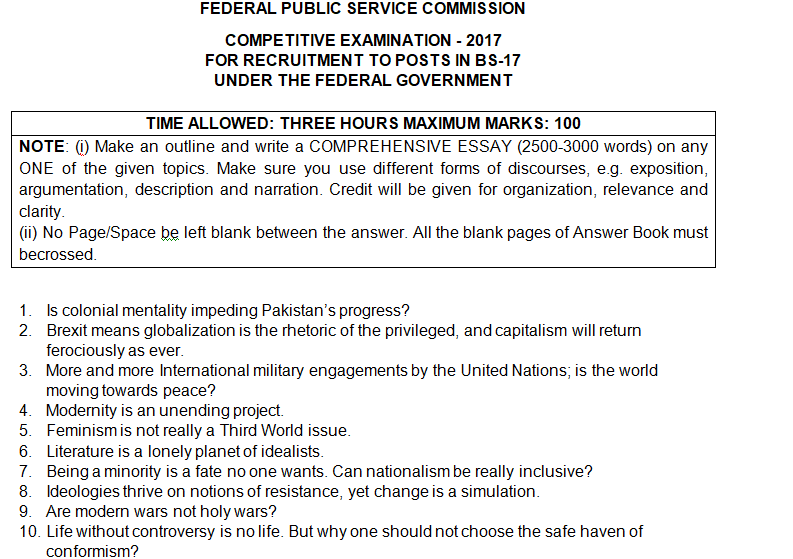CSS Essay Paper 2017
- Is colonial mentality impeding Pakistan’s progress?
- Brexit means globalization is the rhetoric of the privileged, and capitalism will return ferociously as ever.
- More and more International military engagements by the United Nations; is the world moving towards peace?
- Modernity is an unending project.
- Feminism is not really a Third World issue.
- Literature is a lonely planet of idealists.
- Being a minority is a fate no one wants. Can nationalism be really inclusive?
- Ideologies thrive on notions of resistance, yet change is a simulation.
- Are modern wars not holy wars?
- Life without controversy is no life. But why one should not choose the safe haven of conformism?
Summaries:
Here are simplified summaries of the additional essays:
1. Is Colonial Mentality Impeding Pakistan’s Progress?
This essay discusses how the lingering effects of colonialism continue to influence Pakistan’s development. The writer argues that a colonial mentality—where the country still looks to former colonial powers for guidance—hinders progress. The essay calls for a shift towards independent thinking and self-reliance to overcome these mental barriers and move forward.
2. Brexit Means Globalization is the Rhetoric of the Privileged, and Capitalism Will Return Ferociously as Ever
This essay analyzes the implications of Brexit on global politics and economics. The writer argues that Brexit represents a backlash against globalization, which has often been seen as benefiting the wealthy and powerful. The essay predicts that this retreat from globalism could lead to a resurgence of aggressive capitalism, where inequality and exploitation increase, undermining global unity and cooperation.
3. More and More International Military Engagements by the United Nations: Is the World Moving Towards Peace?
This essay questions whether the growing involvement of the United Nations in military interventions is leading the world toward peace. The writer argues that while the UN’s interventions are intended to maintain peace, they often lead to more conflict and instability. The essay calls for a reevaluation of the UN’s role in international peacekeeping to ensure that it genuinely contributes to lasting peace.
4. Modernity is an Unending Project
This essay discusses the concept of modernity as an ongoing process, rather than a finished state. The writer argues that modernity—characterized by technological advancements, societal changes, and progress—is never truly completed and continues to evolve. The essay reflects on how societies constantly adapt to new challenges, reshaping their ideas of progress and development.
5. Feminism is Not Really a Third World Issue
This essay critiques the idea that feminism is mainly a Western issue, suggesting that it is equally relevant in the Third World. The writer argues that women in developing countries face unique forms of oppression, but feminism can be a powerful tool for social change everywhere. The essay calls for a broader, global understanding of feminism that addresses the struggles of women in all parts of the world.
6. Literature is a Lonely Planet of Idealists
This essay portrays literature as a realm for idealists—those who dream of a better world through words. The writer suggests that writers often feel isolated from the reality of society, as they challenge norms and envision new possibilities. The essay reflects on the tension between literary ideals and the harshness of the world, portraying literature as both a refuge and a platform for change.
7. Being a Minority is a Fate No One Wants. Can Nationalism Be Really Inclusive?
This essay explores the challenges faced by minorities in nationalist movements, which often prioritize the interests of the majority. The writer questions whether true nationalism can be inclusive, offering space for minority identities while still maintaining a strong national identity. The essay argues that nationalism must evolve to embrace diversity and equality for all groups.
8. Ideologies Thrive on Notions of Resistance, Yet Change is a Simulation
This essay examines the relationship between ideologies and resistance, suggesting that ideologies often rely on the idea of challenging the status quo to gain followers. However, the writer argues that change in society is often an illusion, with systems of power merely adapting to new forms while maintaining control. The essay critiques the notion of “revolutionary change,” suggesting it is often co-opted by those in power.
9. Are Modern Wars Not Holy Wars?
This essay questions the distinction between modern wars and holy wars, suggesting that modern conflicts, often framed as ideological or political, still carry the same intensity and sense of righteousness as religious wars. The writer argues that modern wars are driven by deep convictions and a desire for control, much like holy wars, even if they are not explicitly framed as religious.
10. Life Without Controversy is No Life. But Why One Should Not Choose the Safe Haven of Conformism?
This essay reflects on the importance of controversy in life, suggesting that without it, life would lack passion and change. The writer argues that controversy challenges existing norms and drives progress, but warns against choosing the comfort of conformity. The essay calls for a balance between embracing controversy and avoiding the safety of simply following the crowd.
